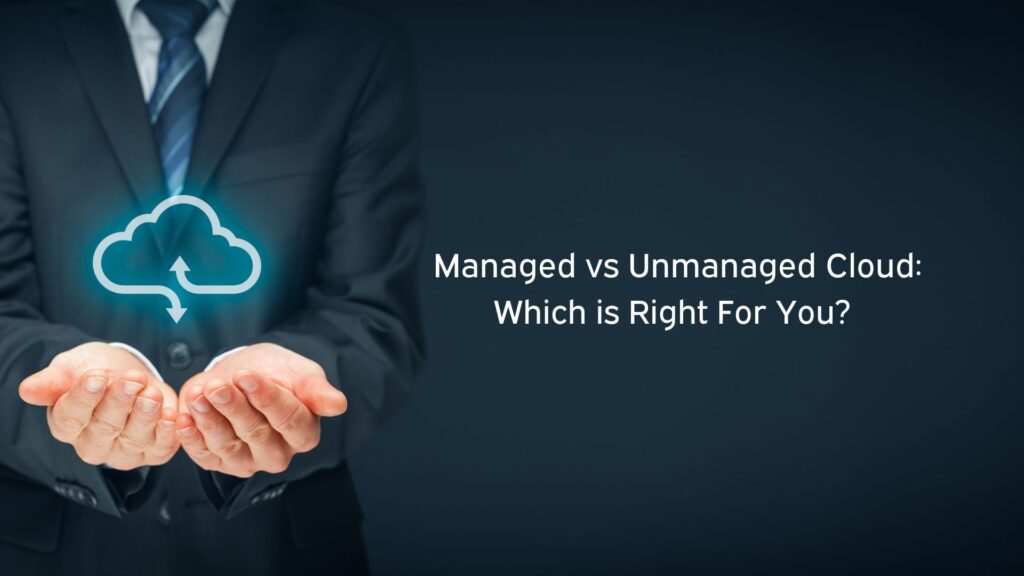
Table of Contents
Managed vs Unmanaged Cloud: How to Choose?
Public cloud providers like Amazon Web Services (AWS), Microsoft Azure, and Google Cloud Platform (GCP) have revolutionized how technology is consumed. They offer on-demand access and almost infinitely scalable storage and compute resources. Rather than spending vast amounts of money on an estimated future need of capacity, you can leverage public clouds to scale up and down resources as needed and pay as you go.
The public cloud is a game changer for startups and companies with elastic demand, allowing them to only pay for what they use. Cloud providers are responsible for the data center infrastructure, and making sure their platform is reliable and secure. This means they are responsible for their cloud infrastructure’s hardware infrastructure, software, operating systems, and virtualization layer. This lessens the need to staff expensive systems engineers.
That said, public cloud customers are responsible for managing numerous technical aspects of the environment themselves. Customers that do not have the expertise to manage their cloud environment, or would prefer to outsource this task to a third party, can rely on managed public cloud services.
This article outlines your responsibilities in an unmanaged cloud environment and the benefits of a managed cloud so you can determine the suitable model for you. If you have questions or want more information on cloud services, contact Brightlio today. We would love to help.
What is an Unmanaged Cloud?
When you purchase public cloud resources, substantive technical responsibilities are left up to you to manage. The provider typically outlines the duties of the provider and the customer in a Shared Responsibility Model.
In an unmanaged or customer-managed public cloud deployment, the customer is responsible for the data and configurations within their cloud environment. Items that are typically customer responsibility include:
- Customer data, data backup, and replication
- Customer applications
- Identity access management
- Network and firewall configuration
- Client-side and server-side encryption
- Network traffic protection, encryption, integrity, and identity
Customers that do not manage these effectively can leave themselves vulnerable to significant performance and data security issues.
As the cloud is pay-per-use, how cloud resources are deployed and managed can significantly affect the monthly cost. Landing workloads on the optimal instance type, leveraging reserve instances, turning off unused instances, and leveraging cloud cost savings tools are all ways to optimize billing. While public cloud providers offer free tools for cost management, it is up to the customer to leverage them properly.

What is Managed Cloud?
In a Managed Cloud deployment, a Managed Cloud Service Provider (MCSP) or hosting provider takes on many of the responsibilities left to the customer in the Shared Responsibility Model. MCSPs have different offerings, but typically include:
- Architectural review
- Ongoing security reviews and monitoring
- Ongoing cost management and monitoring
- Performance monitoring and alerting
- Server maintenance
- Ensure compliance and Access control
- Data backup and replication
- Reporting and dashboarding
Managed Cloud Service Providers leverage a combination of public cloud providers’ tools and proprietary or off-the-shelf tools. These often give customers access to greater visibility, cost management, and security tools than they would have in an unmanaged environment.
A managed cloud service takes many of the challenges of public cloud infrastructure off the customer’s plate so that the customer can focus on their core business. Core customer applications, network connectivity to the cloud, and on-premise customer hardware is typically still customer responsibility unless a more complete managed service is purchased.

Managed vs Unmanaged Cloud: Which is Right For You?
Whether a managed or unmanaged cloud option is best for your business depends on your company’s engineering capabilities, ability, and inclination to use time and resources to manage a cloud environment.
Managed Cloud providers are typically best for smaller and medium-sized organizations that want to leverage the same cloud infrastructure but want to avoid hiring an IT staff or customers new to using the public cloud. Larger organizations may have teams of cloud engineers and developers, making managing the cloud in-house a better decision. Let’s dive deeper into the differences to help you decide.
Benefits of Unmanaged Cloud Services
Unmanaged cloud services can offer an appealing level of control and cost-effectiveness. These self managed services put the reins of the cloud environment firmly in the your hands. This enables total customization of servers, applications, and configurations. Unmanaged cloud services leverage existing technical expertise and offer more control over deployment and updates. An unmanaged cloud is ideal for businesses with strong in-house IT teams or strict budget constraints.
Benefits include:
- Full Control: Unmanaged cloud services offer customers complete control over their cloud environment. Users are responsible for setting up, managing, and troubleshooting their own servers. This allows them to tailor the service to their precise needs.
- Cost-Effective: Unmanaged cloud services often have lower upfront costs because they don’t include management fees. This makes them an attractive choice for businesses on a tight budget or those with the in-house expertise to manage the service themselves.
- Technical Skills Utilization: Companies with a robust in-house IT team might prefer unmanaged cloud services, allowing them to fully utilize their team’s skills and expertise.
- Flexibility and Customization: Unmanaged cloud services allow businesses to customize their infrastructure to fit their desired specifications. They can choose the software, applications, and configurations that best suit their operations.
- Rapid Deployment: Without the need to coordinate with a managed services provider, organizations can often deploy and update their applications more quickly on unmanaged cloud services.

Benefits of Managed Cloud Services
Managed cloud services offer a comprehensive solution for businesses of all sizes. Managed cloud services offer a comprehensive solution for businesses of all sizes. Benefits include 24/7 expert support, robust security measures, comprehensive data management, and freeing up resources. These services mitigate the complexity of the cloud environment, ensuring that it remains a powerful tool for business growth rather than a source of challenges and frustrations.
- Expertise and Experience: Managed cloud providers bring a wealth of expertise and experience in managing complex cloud environments. They ensure your cloud servers are optimally configured, secure, and updated with the latest technology.
- 24/7 Support: Managed cloud providers offer round-the-clock support, quickly resolving any technical issues to ensure high availability and minimal downtime.
- Security and Compliance: Managed cloud providers handle security threats and cyber threats, protecting your data with robust security measures like firewalls, intrusion detection systems, and secure access controls. They also stay updated with compliance requirements relevant to your business.
- Data Management: Managed cloud services handle critical data management tasks, including regular data backups and disaster recovery. This ensures your data is safe and accessible, even in the event of a disaster or technical issues.
- Focus on Core Business: By taking care of the technical aspects of your cloud environment, managed cloud services allow you to focus on core business needs. Your IT team can devote their time to strategic projects, driving innovation and growth in your business.

How Can Brightlio Help?
Whether you are looking to procure cloud resources that you manage yourself or if you are looking for a fully managed public cloud solution, Brightlio can help. Brightlio has a strategic partnership with leading Managed Cloud Service Providers to offer fully managed services and cost-optimized cloud solutions.
Additionally, Brightlio offers solutions, including colocation, network connectivity, unified communications, SD-WAN, and advisory services.
Engage Brightlio today to see how we can assist with your cloud needs. It would be our privilege to partner with you.
Frequently Asked Questions
What are AWS managed services?
AWS managed services are a suite of services offered by Amazon Web Services (AWS), a managed cloud provider. They handle the day-to-day operations of your AWS cloud environment. This includes regular maintenance, security, backup, and other underlying resources, allowing your IT team to focus on core business tasks.
How do managed cloud services differ from regular hosting providers?
Unlike traditional hosting providers that generally offer a limited control environment, managed cloud providers offer a suite of services. Typical services include system maintenance, security, backup, disaster recovery, and more. They also provide customized solutions tailored to your particular needs, delivering more value than typical hosting providers.
Is it more cost-efficient to use a managed cloud service or to rely on an expert in-house team?
This can vary depending on your business size, needs, and resources. While an expert in-house team can provide greater control, it also requires more effort and expense in terms of hiring, training, and retaining staff. On the other hand, a managed cloud service often leads to cost efficiency in the long run, as it includes technical expertise, maintenance, and support in the service fee.
Are there any downsides to using AWS managed services?
One possible downside is that, compared to unmanaged services, you may have limited control over certain aspects of your cloud environment because the AWS managed service team manages it. However, for many businesses, the benefits of decreased workload, expert management, and support outweigh this concern.
What is managed cloud hosting?
Managed cloud hosting is a service provided by a hosting provider where they manage and maintain your cloud environment, freeing you to focus on your business.
Recent Posts
Vancouver Data Centers: Colocation in the Pacific Northwest
Business Broadband Solutions: The Ultimate Guide
Let's start
a new project together



